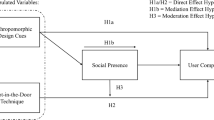Abstract
Drawing on writings within the CSCW community and on recent social theory, this paper proposes that the adoption of speech act theory as a foundation for system design carries with it an agenda of discipline and control over organization members' actions. I begin with a brief review of the language/action perspective introduced by Winograd, Flores and their colleagues, focusing in particular on the categorization of speakers' intent. I then turn to some observations on the politics of categorization and, with that framework as back-ground, consider the attempt, throughthe coordinator, to implement a technological system for intention-accounting within organizations. Finally, I suggest the implications of the analysis presented in the paper for the politics of CSCW systems design.
Similar content being viewed by others
References
Agre, Philip. (1993): From high tech to human tech: on the sudden market for social studies of technology. In the proceedings of the workshopSocial science research, technical systems and cooperative work. Paris, France, pp. 17–30.
Austin, J.L. (1962):How To Do Things With Words, Oxford: Clarendon Press.
Bogen, David. (1991): Linguistic Forms and Social Obligations: A critique of the doctrine of literal expression in Searle. InJournal for the Theory of Social Behavior, vol. 21, No. 1, pp. 31–62.
Bowers, John. (1992): The Politics of Formalism. InContexts of Computer-Mediated Communication ed. M. Lea Hassocks: Harvester.
Bowers, John and Chrucher, John. (1988): Local and Global Structuring of Computer-Mediated Communication. InProceedings of the ACM Conference in Computer-Supported Cooperative Work, Portland, OR, pp. 125–139.
Bullen, Christine and Bennett, John. (1990): Learning from user experience with groupware. InProceedings of the ACM Conference on Computer-Supported Cooperative Work, Los Angeles, CA, pp. 291–302.
Duranti, Alessandro. (1991): Intentionality and Truth: An Ethnographic Critique. unpublished manuscript, Department of Anthropology, University of California, Los Angeles.
Flores, Fernando, M. Graves, B. Hartfield and T. Wonograd. (1988): Computer Systems and the Design of Organizational Interaction. InACM Transactions on Office Information Systems, Special Issue on the Language/Action Perspective. vol. 6, No. 2, pp. 153–172.
Foucault, Michel. (1979):Discipline and Punish: The Birth of the Prison. NY: Random House.
Garfinkel, Harold and Sacks, Harvey. (1970): On Formal Structures of Practical Action. InTheoretical Sociology, McKinney and E. Tiryakian eds. New York: Appleton-Century-Crofts, pp. 337–366.
Goodwin, Charles. (1981):Conversational Organization: Interaction between Speakers and Hearers. New York: Academic Press.
Goodwin, Charles and Goodwin, Marjorie. (1992): Assessments and the construction of context. In A. Duranti and C. Goodwin (eds.)Rethinking Context: Language as an interactive phenomenon. Cambridge, UK: Cambridge University Press, pp. 147–190.
Haraway, Donna J. (1991): Science as Culture, Science Studies as Cultural Studies? Paper prepared for the volumeCultural Studies Now and in the Future, P. Treichler, C. Nelson, and L. Grossberg (eds.), in prep., presented at a conference on Disunity and Contextualism: New Directions in the Philosophy of Science Studies. Stanford University, March 31–April 1.
Johnson, B., G. Weaver, M. Olson and R. Dunham. (1986): Using a computer-based tool to support collaboration: A field experiment: InProceedings of the ACM Conference on Computer-Supported Cooperative Work, Austin, TX, pp. 343–352.
Levinson, S. (1983): Speech Act. Chapter 5 inPragmatics. Cambridge, UK: Cambridge University Press.
Lynch, Michael. (1990): Pictures of Nothing? Visual Construals in Social Theory. Paper presented at the 85th Annual Meeting of the American Sociological Association, Washington, D.C., August.
Robinson, Mike and Bannon, Liam. (1991): Questioning Representations. InProceedings of the European Conference on Computer-Supported Cooperative Work, Amsterdam, The Netherlands, pp. 219–234.
Sacks, Harvey. (1979): Hotrodder: A Revolutionary Category. InEveryda Language: Studies in Ethnomethodology, ed. G. Psathas, NY: Irvington, pp. 7–14.
Sacks, Harvey and Schegloff, Emanuel. (1979): Two Preferences in the organization of references to persons in conversation and their interaction. InEveryday Language: Studies in Ethnomethodology, ed. G. Psathas, New York: Irvington, pp. 15–21.
Schegloff, Emanuel (nd) To Searle on Conversation: A Note in Return. Prepared for a volume of essays in response to the work of John Searle, unpublished manuscript, Department of Sociology, University of California, Los Angeles.
Schegloff, Emanuel. (1972): Notes on a Conversational Practice: Formulating place. InStudies in Social Interaction, ed. D. Sudnow, New York: Free Press, pp. 75–119.
Schegloff, Emanuel. (1982): Discourse as an Interactional Achievement. InAnalyzing Discourse: Text and Talk, ed. D. Tannen, Georgetown Roudtable on Language & Linguistics, Washington, D.C.: Georgetown University Press, pp. 71–93.
Schegloff, Emanuel. (1988): Presequences and Indirection: Applying speech act theory to ordinary conversation.In Journal of Pragmatics, vol. 12, pp. 55–62.
Suchman, Lucy. (1993): Technologies of Accountability: On Lizards and Aeroplanes. In: G. Button (ed.)Technology in Working Order: Studies in work, interaction and technology. London: Routledge, pp. 113–126.
Winner, Langdon. (1986): Do Artefacts Have Politics? InThe Whale and the Reactor. Chicago: University of Chicago Press, pp. 19–39.
Winograd, Terry and Fernando Flores. (1986):Understanding Computers and Cognition: A New Foundation for Design. Norwood, NJ: Ablex.
Wittgenstein, Ludwig. (1958):Philosophical Investigations. Oxford: Blackwell.
Yates, JoAnn. (1989):Control through Communication. Baltimore and London: Johns Hopkins University Press.
Author information
Authors and Affiliations
Rights and permissions
About this article
Cite this article
Suchman, L. Do categories have politics?. Comput Supported Coop Work 2, 177–190 (1993). https://doi.org/10.1007/BF00749015
Received:
Accepted:
Published:
Issue Date:
DOI: https://doi.org/10.1007/BF00749015




